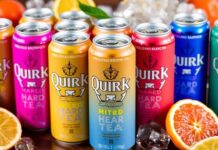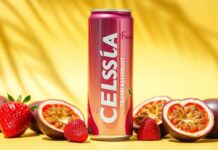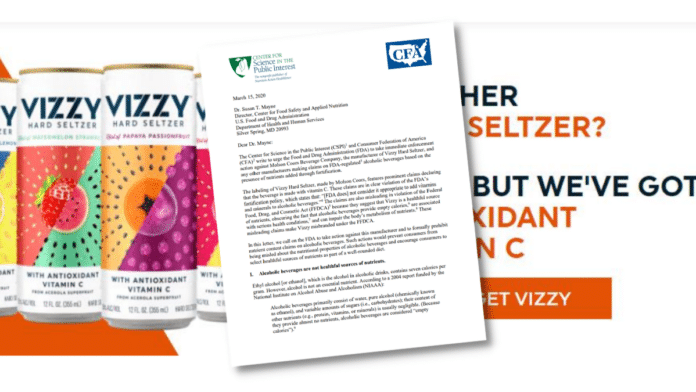A pair of consumer advocacy nonprofit groups teamed up to write a letter to the FDA, targeting Vizzy for its practices around adding, and subsequently advertising, vitamin C to its hard seltzers. The Center for Science in the Public Interest (CSPI) and the Consumer Federation of America shared letterhead on the 13-page note to FDA.
The primary beef to the FDA is that its “guidance” should be converted to a more sweeping law that would “formally prohibit nutrient content claims on alcoholic beverages.” Watchdog organizations often find traction with large corporate brands when trying to impact change.
The letter goes into some detail about the number of calories in alcoholic beverages, and the associated void of nutritional benefit. Adding something with nutritional benefit does not counteract the dangers of alcohol, the letter argues. Hard seltzer’s rise in popularity is largely due to the public demanding lower calorie, lower carb, lower sugar — and lower alcohol content adult beverages. Hard seltzers are defined as carbonated flavored brewed beverages with 4.5% to 6% ABV, gluten free, and low in sugar.
“Claims such as ‘made with antioxidant vitamin C’ convey healthfulness and are misleading on alcoholic beverages given their empty calories, association with serious health conditions, and anti-nutrient properties,” the carefully constructed letter states. “Such claims may mislead consumers to believe alcoholic beverages are healthful sources of nutrients.”
Vizzy was launched in 2020 by Molson Coors (NYSE: TAP), and quickly gained market share with its off-centered, edgy approach to marketing. Its addition of vitamin C was an early differentiator, and has since been copied by other hard seltzer brewers.
Hard Seltzer News contacted Vizzy for a comment. “While antioxidant Vitamin C is part of what makes Vizzy stand out, we have always been committed to communicating this product attribute responsibly,” said Marty Maloney, Manager of Media Relations at Molson Coors.
“While antioxidant Vitamin C is part of what makes Vizzy stand out, we have always been committed to communicating this product attribute responsibly.”
Marty Maloney, Manager of Media Relations at Molson Coors
Open for Interpretation
The letter does acknowledge that there is room for interpretation. “Although foods bearing claims based on a nutrient addition that is inconsistent with the fortification policy are not per se false and misleading, FDA has made clear that such fortifications ‘could . . . result in deceptive or misleading claims for certain foods’ and that the agency ‘will continue to determine in specific situations whether labeling claims about nutrient additions may be false or misleading,'” the letter said.
The CSPI has previously sued the company, which at the time was MillerCoors Brewing company. The brand Sparks was targeted in that lawsuit because it contained caffeine and guarana. The organization argued that the ingredients would lead to “more drunk driving, more injuries, and more sexual assaults.”
Among others, the letter is signed by Peter Lurie, MD, MPH, President and Executive Director of the CSPI.
Historical Guidance from CSPI
Being a consumer watchdog isn’t always easy. As science evolves, certain guidance also changes, such as the health benefits of fatty milk or trans fats.
The CSPI once launched a campaign to advocate for the consumption of lower fat milk. Dubbed “1% or Less” the campaign effectively used paid advertising, public relations, and community-based programs to change purchasing behaviors. During the eight week pilot campaign, sales of low-fat milk doubled. Current research as of 2018, however, suggests “higher-fat-content dairy products carry greater nutritional benefit, with neutral impact on cardiovascular disease from milk, and neutral to favorable impact from fermented dairy products.”
In 1989, CSPI was instrumental in convincing quick service restaurants to stop using animal fat for frying. Companies such as KFC and McDonald’s succumbed to the pressure. The CSPI had assumed that trans fats were benign. They would later campaign against the use of trans fats, as studies in the 1990s linked trans fats with an increase risk for heart disease.
- ThirstyFrog Sets Sail - September 7, 2022
- Tell Me Whey: Dairy Hard Seltzer Developed by Cornell Scientist - July 24, 2022
- Constellation Brands Expected to Announce Significant Quarterly Increase in Sales - September 27, 2021














